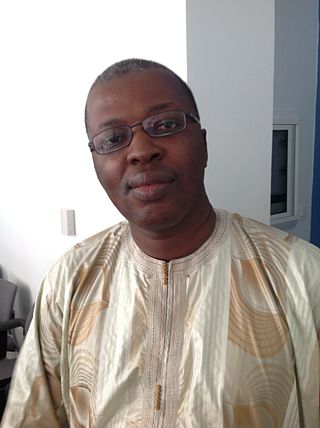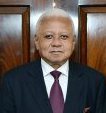Selected awards
| | This section is empty. You can help by adding to it. (April 2021) |
Emile Francis Short | |
|---|---|
| 1st Commissioner for Human Rights and Administrative Justice | |
| In office 1993 –December 2010 | |
| President | Jerry Rawlings |
| Succeeded by | Lauretta Lamptey |
| Deputy | Anna Bossman |
| Personal details | |
| Born | February 6,1943 Cape Coast |
| Nationality | Ghanaian |
| Spouse | Gladys Quarshie Short |
| Children | Maxine Beauport Short,Emil Short,Jennifer Mograbi Short |
| Alma mater | St. Augustine's College (Cape Coast),University of London,London school of Economics and Political Science |
| Profession | Judge,Academic |
Emile Francis Short is a Ghanaian judge and academic and the first Commissioner on Human Rights and Administrative Justice in Ghana. [1]
Short was born on February 6,1943,in Cape Coast,Gold Coast to Joseph Short,a Sierra Leonean lawyer and Wilhelmina Short,née Smith,a Fante who was of partial Sierra Leonean descent through her paternal grandfather,Francis Smith (judge),a justice of the Supreme Court of the Gold Coast. He started is early education at the Jubilee School,Cape Coast. At age 12,he was enrolled to St. Augustine's College in Cape Coast for his O and A Level certificates. Upon completion of his secondary education,short furthered to the University of London where he studied LLB degree in law. He was called to the Bar in England in 1966 after studying for Barrister-at-Law certificate at Lincoln's Inn. He obtained a Master's degree in Law (LL. M.) from the London School of Economics and Political Science. [2] He was called to Ghana Bar in 1973,after studying Orientation course in customary law at the Ghana School of Law. He also hold a honorary doctorate from Northwestern University in Illinois. [3]
Short started his legal career in Sierra Leon,where he was appointed as a state attorney in 1968 after teaching briefly at Middlesex Polytechnic in London,United Kingdom. He started his legal practice in Ghana in 1974 and headed Max-Idan Chambers in Cape Coast. He lectured at the University of Cape Coast in the Central Region of Ghana and He also serve as a consultant for the United Nations Development Programme (UNDP),the Commonwealth Secretariat in London,and the Carter Center in the United States.
He was appointed the Commissioner for Human Rights and Administrative Justice in Ghana at the beginning of the Fourth Republic in 1993 by President Jerry Rawlings.
In 2004,he took indefinite leave from his position at CHRAJ to be the ad litem judge with the United Nations International Criminal Tribunal for Rwanda at Arusha in Tanzania after he had been elected to that position by the United Nations General Assembly. [4] This was during the prosecution for war crimes in Rwanda. He returned to his position at CHRAJ in August 2009. [5] He retired in December 2010. [6]
Short has also advised on international law,human rights and administrative justice on various occasions.
| | This section is empty. You can help by adding to it. (April 2021) |

The African Court on Human and Peoples' Rights, also known simply as the African Court, is an international court established by member states of the African Union (AU) to implement provisions of the African Charter on Human and Peoples' Rights. Seated in Arusha, Tanzania, it is the judicial arm of the AU and one of three regional human rights courts.

International criminal law (ICL) is a body of public international law designed to prohibit certain categories of conduct commonly viewed as serious atrocities and to make perpetrators of such conduct criminally accountable for their perpetration. The core crimes under international law are genocide, war crimes, crimes against humanity, and the crime of aggression.

The Judiciary of Ghana comprises the Superior Courts of Judicature, established under the 1992 Constitution, and the Inferior Courts, established by Parliament. The hierarchy of courts derives largely from British juridical forms. The courts have jurisdiction over all civil and criminal matters.
Frederick Kwasi Apaloo was a Ghanaian judge who served as Chief Justice of Kenya from 1993 to 1995 and Chief Justice of Ghana from 1977 to 1986. He is the only judge to have served on the Supreme Court of Ghana under three Ghanaian republics.

Political corruption in Ghana has been common since independence. Since 2017, Ghana's score on Transparency International's Corruption Perceptions Index has improved slightly from its low point that year, a score of 40 on a scale from 0 to 100. Ghana's score rose to 43 by 2020 and has remained there until the present, 2023. When ranked by score among the 180 countries in the 2023 Index, Ghana ranked 70th, where the country ranked first is perceived to have the most honest public sector. For comparison with worldwide scores, the best score was 90, the average score was 43, and the worst score was 11. For comparison with regional scores, the average score among sub-Saharan African countries was 33. The highest score in sub-Saharan Africa was 71 and the lowest score was 11.

The chief justice of Ghana is the highest-ranking judge of the Supreme Court of Ghana. The chief justice is also the head of the Judiciary of Ghana and is responsible for its administration and supervision. In order of state precedence, the chief justice is the fourth highest official in Ghana.

Hassan Bubacar Jallow is a Gambian judge who has served as Chief Justice of the Gambia since February 2017. He was the Prosecutor of the International Criminal Tribunal for Rwanda (ICTR) from 2003 to 2016, and Prosecutor of the International Residual Mechanism for Criminal Tribunals (IRMCT) from 2012 to 2016, both at the rank of United Nations Under Secretary-General. He served as Minister of Justice and Attorney General from 1984 to 1994 under President Dawda Jawara.

Abdul Tejan-Cole is a Sierra Leonean Oku legal practitioner and former Commissioner of Sierra Leone's Anti-Corruption Commission. He was awarded the 2001 Human Rights Watch award.
Anees Ahmed is an Indian lawyer. He served as the Chief of Judicial and Legal Affairs, and formerly the Head of Chambers, of the United Nations International Criminal Tribunal for Rwanda.

Charles Ayodeji Adeogun-Phillips is a former United Nations genocide and war crimes prosecutor, international lawyer and founder of Charles Anthony (Lawyers) LLP.

The Commission on Human Rights and Administrative Justice (CHRAJ) is an independent governmental organization charged with safeguarding of human rights and investigating human rights abuses in Ghana. It was established in 1993 by Act 456 of the Parliament of Ghana as directed by Article 216 of the 1992 Ghana constitution.
Lauretta Vivian Lamptey is a former Ghanaian Commissioner on Human Rights and Administrative Justice. She is a lawyer and an investment banker.
United Nations Security Council Resolution 1878 was unanimously adopted on 7 July 2009.

Mohamed Chande Othman is a Tanzanian lawyer and a former Chief Justice of Tanzania.
Francis Smith was a Sierra Leonean Puisne Judge in the Gold Coast. He was the second Sierra Leonean to qualify as a barrister after he passed the bar at Middle Temple on 26 January 1871.

Vivek Maru is an American social entrepreneur and human rights activist who is a pioneer in the field of legal empowerment. He is currently the CEO of Namati, which he founded in 2011. Namati and its partners have supported cadres of grassroots legal advocates – sometimes known as "barefoot lawyers" or "community paralegals"– in ten countries. These advocates equip their communities to protect common lands, enforce environmental law, and secure basic rights to healthcare and citizenship.
Kwasi Anin-Yeboah is a Ghanaian judge and the immediate past Chief Justice of Ghana. In December 2019, President Nana Addo Dankwa Akufo-Addo nominated Justice Anin-Yeboah as the Chief Justice of Ghana.
Joseph Akanjolenur Whittal is a Ghanaian who is the Commissioner of Human Rights and Administrative Justice of Ghana since December 2016.
The Smith family is a Sierra Leone Creole family of English, Jamaican Maroon and Liberated African descent based in Freetown, Sierra Leone. The Smiths were first-generation Sierra Leone Creoles of Gold Coast Euro-African and Caribbean origin who settled in Sierra Leone during the early 19th century. There are several descendants of the family in the United Kingdom and the United States, as well as in the Ghanaian cities of Accra and Cape Coast. Several members of the family were active in business, women's education, civil administration, the arts, medicine, poetry, the judiciary, cultural studies, Pan-Africanism and anti-colonial activism.